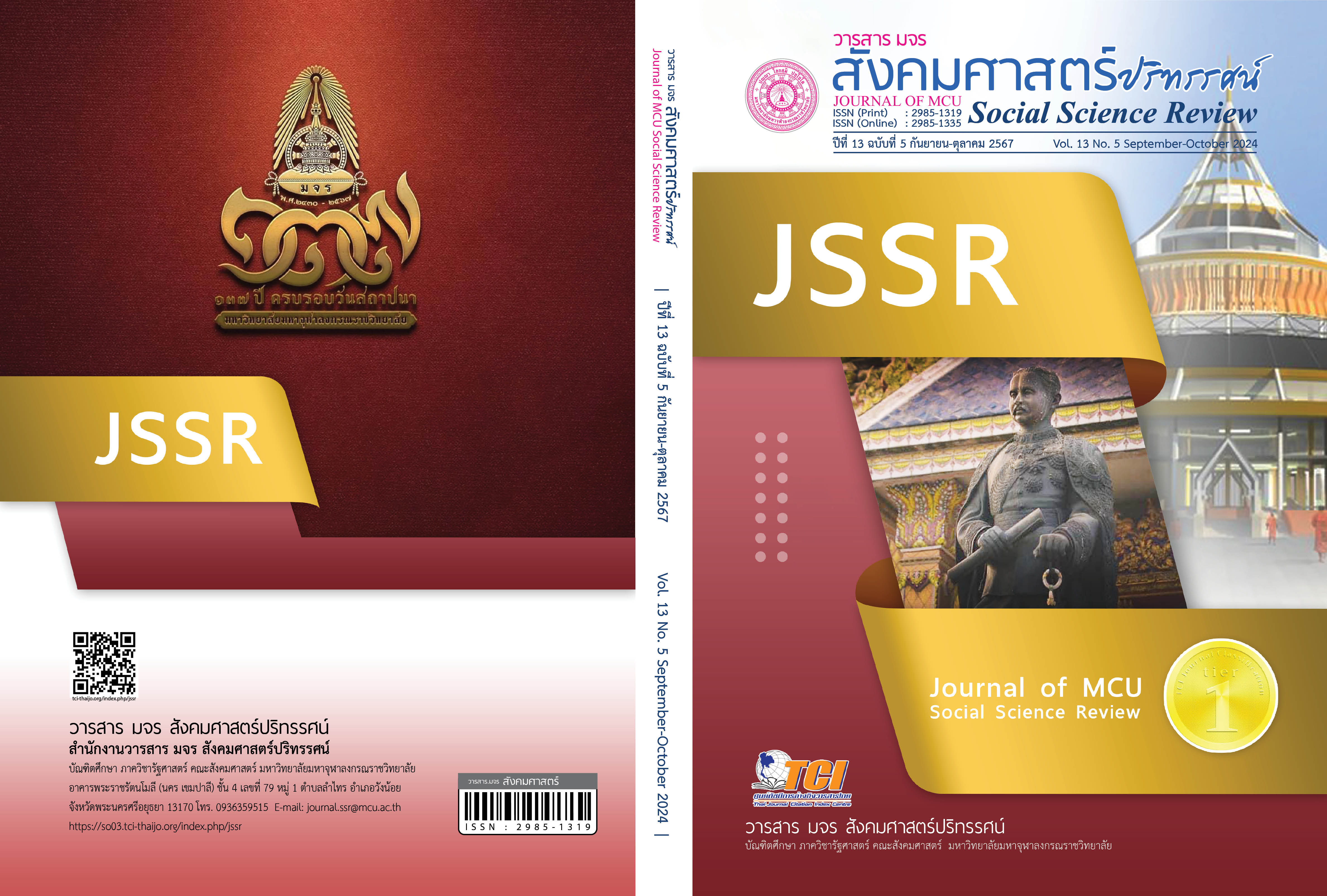รูปแบบการใช้หลักธรรมทางพระพุทธศาสนาเพื่อขับเคลื่อนเศรษฐกิจยุคดิจิทัล สู่การพัฒนาที่ยั่งยืนในยุคดิจิทัล
คำสำคัญ:
หลักธรรม, เศรษฐกิจยุคดิจิทัล, การพัฒนาที่ยั่งยืนบทคัดย่อ
บทความวิชาการนี้มีวัตถุประสงค์เพื่อศึกษารูปแบบการใช้หลักธรรมทางพระพุทธศาสนาเพื่อขับเคลื่อนเศรษฐกิจยุคดิจิทัลสู่การพัฒนาที่ยั่งยืนในยุคดิจิทัล ผลการศึกษาพบว่าหลักการและวิธีการทางด้านเศรษฐกิจของพุทธธรรมนั้น เป็นการดำเนินการทางเศรษฐกิจทั้งด้านการผลิต การบริโภค การกระจาย และการแลกเปลี่ยน ซึ่งอธิษฐานธรรม เป็นธรรมที่มีความสำคัญต่อมนุษย์เราเป็นอย่างยิ่ง เพราะเป็นธรรมที่มุ่งเน้นให้คนเป็นคนที่มีการพัฒนาชีวิต มีหลักยึด
มีอุดมการณ์ที่แน่วแน่ เป็นไปเพื่อประโยชน์ต่อตนเองและบุคคลอื่น ทำให้ประสบความสำเร็จในชีวิต เมื่อผู้บริหารองค์กรมีอธิษฐานธรรมแล้ว ย่อมทำให้มีความมั่นคงในธรรม ทำให้กำหนดนโยบายนำพาองค์กรไปสู่องค์กรที่มีความรับผิดชอบต่อสังคม โดยขับเคลื่อนเศรษฐกิจยุคดิจิทัลสู่การพัฒนาที่ยั่งยืนในยุคดิจิทัล
เอกสารอ้างอิง
บุญมี แท่นแก้ว. (2530). จริยศาสตร์. กรุงเทพฯ: สำนักพิมพ์โอเดี่ยนสโตร.
พระธรรมปิฎก (ป.อ. ปยุตฺโต). (2538). พจนานุกรมพุทธศาสตร์ ฉบับประมวลธรรม (พิมพ์ครั้งที่ 8). กรุงเทพฯ: โรงพิมพ์มหาจุฬาลงกรณราชวิทยาลัย.
พระมหาทองคูณ ธีรปญฺโญ. (2549). การศึกษาเปรียบเทียบเรื่อง นิพพานในพระพุทธศาสนาเถรวาทมหานิกายโยคาวจารและวัดพระธรรมกาย (วิทยานิพนธ์พุทธศาสตรมหาบัณฑิต สาขาวิชาพระพุทธศาสนา). พระนครศรีอยุธยา: มหาวิทยาลัยมหาจุฬาลงกรณราชวิทยาลัย.
พระวรศักดิ์ วรธมฺโม. (2540). พุทธจริยธรรมเพื่อมนุษยชาติ (ฉบับสมบูรณ์). กรุงเทพฯ: ธรรมสภา.
พิชญาภัค เพชรสีสุข. (2565). ESG แนวคิดความยั่งยืนที่องค์กรควรใช้เป็นเครื่องมือ หรือแค่เทรนด์ตามกระแส. สืบค้น 3 มกราคม 2565, จาก https://shorturl.asia/XdmcC
มูลนิธิพระราชศรัทธา. (2537). พระธรรมเทศนา กัณฑ์ที่ 29 เรื่องอธิษฐานธรรมความดีมั่นคง. กรุงเทพฯ: โรงพิมพ์เลี่ยงเซียง.
ราชบัณฑิตยสถาน. (2546). พจนานุกรม ฉบับราชบัณฑิตยสถาน พ.ศ. 2542. กรุงเทพฯ: ศิริวัฒนา อินเตอร์พริ้น.
สุชีพ ปุญญานุภาพ. (2538). พจนานุกรมศัพท์พระพุทธศาสนา (พิมพ์ครั้งที่ 7). กรุงเทพฯ: โรงพิมพ์มหามกุฏราชวิทยาลัย.
สุทธิพงศ์ ตันตยาพิศาลสุด และคมสันต์ สังฆมณี. (2551). ประมวลสารคดีธรรม เรื่อง ทำไมคนเราต้องมีศาสนา. กรุงเทพฯ: โรงพิมพ์การศาสนา.
อภิญญา สิระนาท. (2564). การนำเป้าหมายการพัฒนาที่ยั่งยืน (SDGS) มาวัดผลกระทบมีความสำคัญต่อภาคธุรกิจอย่างไร?. สืบค้น 3 มกราคม 2565, จาก https://shorturl.asia/p1LGq
ดาวน์โหลด
เผยแพร่แล้ว
รูปแบบการอ้างอิง
ฉบับ
ประเภทบทความ
สัญญาอนุญาต
ลิขสิทธิ์ (c) 2024 วารสาร มจร สังคมศาสตร์ปริทรรศน์

อนุญาตภายใต้เงื่อนไข Creative Commons Attribution-NonCommercial-NoDerivatives 4.0 International License.
เพื่อให้เป็นไปตามกฎหมายลิขสิทธิ์ ผู้นิพนธ์ทุกท่านต้องลงลายมือชื่อในแบบฟอร์มใบมอบลิขสิทธิ์บทความให้แก่วารสารฯ พร้อมกับบทความต้นฉบับที่ได้แก้ไขครั้งสุดท้าย นอกจากนี้ ผู้นิพนธ์ทุกท่านต้องยืนยันว่าบทความต้นฉบับที่ส่งมาตีพิมพ์นั้น ได้ส่งมาตีพิมพ์เฉพาะในวารสาร มจร สังคมศาสตร์ปริทรรศน์ เพียงแห่งเดียวเท่านั้น หากมีการใช้ภาพหรือตารางหรือเนื้อหาอื่นๆ ของผู้นิพนธ์อื่นที่ปรากฏในสิ่งตีพิมพ์อื่นมาแล้ว ผู้นิพนธ์ต้องขออนุญาตเจ้าของลิขสิทธิ์ก่อน พร้อมทั้งแสดงหนังสือที่ได้รับการยินยอมต่อบรรณาธิการ ก่อนที่บทความจะได้รับการตีพิมพ์ หากไม่เป็นไปตามข้อกำหนดเบื้องต้น ทางวารสารจะถอดบทความของท่านออกโดยไม่มีข้อยกเว้นใดๆ ทั้งสิ้น





